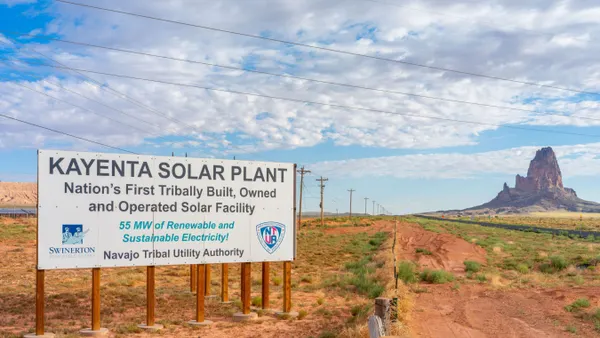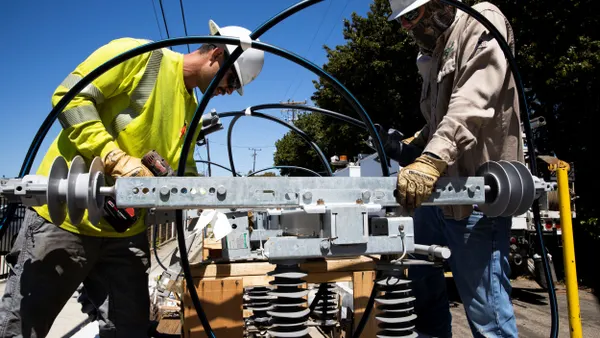Dive Brief:
- Florida Power & Light on June 19 proposed two pilot electric vehicle (EV) tariffs, including a $0.30/kWh charging rate for utility-owned DC Fast Charging (DCFC) stations and another mechanism designed to mitigate the impact of demand charges on stations with low utilization.
- FPL told regulators that the per-kilowatt hour rate is "comparable on a cost-per-mile basis to recent gasoline prices."
- The utility is in the process of rolling out 1,000 Level 2 charging ports at about 100 locations and a network of 75 fast-charging dispensers located at 16 locations, each about 50 miles apart. FPL and other EV charging companies are building out infrastructure in the state, but acknowledge that older charging tariffs need to be revamped in order to facilitate greater adoption.
Dive Insight:
FPL told regulators that continued growth will require widespread charging infrastructure and appropriate electricity rate plans to enable deployment.
The Sunshine State ranks among the top four states in the country for EV adoption, according to FPL's filing, and at the end of 2019 had about 57,000 plug-in vehicles on its roads. The utility estimates there are 35,000 EVs in its service territory — and believes that number will approach 600,000 by 2030, eventually representing roughly 5% of total in-territory registered vehicles.
EV registrations in the state have doubled over the last three years, and FPL expects that growth to accelerate going forward. The proliferation of DCFC stations will be necessary to enable growth, but the impact of demand charges on stations with low utilization rates is a known issue.
Demand charges are the fees utilities impose on a load to address excess transmission capacity needed to serve its peak demand. Depending on how often the stations are used, "it is not uncommon for demand charges incurred by public fast charge stations to be significantly greater than their energy charges," FPL said in its application.
"This situation can lead to electricity bills that far exceed the revenue that these stations can receive from their customers," the utility said. "At low levels of utilization, the electricity bills incurred at these stations result in an uneconomic effective cost per kWh, as high demand charges are spread over a relatively low volume of energy sales."
To address this, FPL proposed a five-year pilot rider that features a "demand limiter" mechanism. Under the rider, the amount of demand billed to public DCFC stations would be the lesser of either: measured demand, as conventionally determined; or limited demand, calculated by dividing kilowatt-hour energy sales a fixed constant of 75 hours.
"Traditional commercial rate schedules don't work well for some of these fast charging stations because the stations pay one rate for the amount of energy and another for their peak demand," FPL spokesperson Alys Daly told Utility Dive. "That's an economic challenge that contributes to problems in deploying chargers and the mass adoption of EVs."
The proposed tariff aims to address those challenges by ensuring demand charges are "never unreasonably high compared to the amount of energy stations are using," Daly said.
FPL is also proposing a $0.30/kWh volumetric rate for DCFC stations it will own, and says this is comparable on a cost-per-mile basis to recent gasoline prices as well as what other providers are charging. Tesla, EVgo and Electrify America also operate public fast charging stations in Florida, at a range of prices.
According to FPL's filing, Tesla charges about $0.28/kWh at its proprietary stations while EVgo charges about $0.42/kWh. Electrify America charges between $0.19/kWh and $0.51/kWh, depending on the rate of charge available.
Tesla and Electrify America did not respond to requests for comment on the demand charge rider FPL has proposed.
EVgo, in a statement, noted that "utilities across the country have begun to implement commercial EV rates to encourage more private sector investment," and added that it encouraged FPL to consider a "make-ready model" for installing station equipment that has been approved in Colorado, New York, Maine, New Jersey and other places.
That would "catalyze further third party investments at a lower cost to FP&L's ratepayers," the company said. "EVgo is actively expanding its DC fast charging network in Florida and looks forward to finding collaborative ways to work with FP&L."
Clarification: Florida Power & Light is developing 1,000 Level 2 charging ports at about 100 locations and 75 fast-charging dispensers located at 16 locations.














